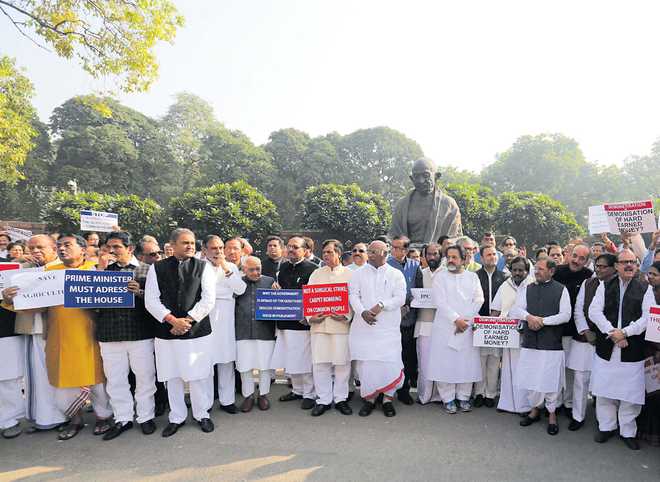ONE of the arguments constantly being thrown at liberals, secularists, centrists and intellectuals who feared the rise to power of Narendra Modi was that they were being alarmist; that they were exaggerating the dangers of authoritarianism because Indian democracy had a robust system of constitutional checks and balances to ensure against such an eventuality.
Well, as the demonetisation exercise has just shown us, how exactly have the checks and balances been effective in stopping the Prime Minister from unleashing one of the most undemocratic executive decisions ever? Doesn't an act that de-legitimised 86 per cent of Indian legal tender overnight through a mere prime-ministerial announcement, make a complete mockery of our claim of so-called robust constitutional checks and balances? Let's see how these have fared:
The President: India's highest constitutional authority, the only one which theoretically has the power to stop the excesses of an elected government, didn't lift a finger to stop demonetisation or even caution or question the Prime Minister against the step and certainly not in public. If he has done so in private, then we don't know about it. Instead, he went on to berate an agitated Opposition publicly for not debating in Parliament, thus only strengthening the government's hand. Surprisingly, he had no sage advice to offer to the government to reach out to the Opposition in the wake of a decision of such magnitude or to the Prime Minister, that he should respect the temple of democracy by being present and listening to Opposition criticism. If that is not strange coming from a self-proclaimed constitutionalist like Pranab Mukherjee, then what is?
The Parliament: Since the NDA has a huge majority in the Lok Sabha and the Prime Minister had bypassed the need of any legislation for demonetisation, the Opposition could do nothing in Parliament apart from trying to embarrass the government or put pressure by disrupting the houses. The intransigence of the treasury benches in relenting to Opposition demands, coupled with the apparent inability or unwillingness of the Speakers (especially, in the Lok Sabha) to be truly neutral and bi-partisan in running the houses, was an object lesson in how Parliament can be rendered redundant by an elected Prime Minister, who refuses to be held accountable.
While the BJP veteran L.K. Advani's laments holding the government and Speaker responsible for the total washout of the winter session are being dismissed as a case of sour grapes, it is a fact that the institutional effectiveness of the legislature as an important constitutional safeguard depends critically on the government's level of commitment to democratic propriety and precedent. By refusing to attend the House and listening to the Opposition, by needlessly insisting on discussions without a vote despite having a huge majority, by disrupting Parliament themselves on the days the Opposition had shown a willingness to discuss, the government brazenly subverted accountability.
The Judiciary: By refusing to step in or stay the demonetisation decision immediately and preferring to examine the matter at a later stage, hasn't the judiciary too shown itself incapable of really being able to safeguard democracy, when it matters most? Let's assume, the judiciary examines the clutch of PILs filed by various citizens or scrutinises the constitutional validity of the decisions, including the many changes of rules and comes to a conclusion that the government is guilty of many violations or illegalities. But what exactly would be the use of a ruling long after demonetisation has wreaked its havoc and the devastating consequences have played themselves out? How would justice have been done, when demonetisation can hardly be rolled back at that stage nor can the damage be undone? Indeed, it would only reinforce the cynical view of the impracticality of justice, that the law cannot prevent injustice from happening in the first place, because it lacks conviction while dealing with the high and mighty.
The Opposition: Despite the huge inconvenience, job loss, financial suffering and disruption that demonetisation has unleashed on the common man, the total lack of protests on the ground reveal just how politically incompetent and discredited all Opposition parties are. It's as if they have simply lost the art of organising political dissent and agitations and the skill of tapping into mass anger and rousing and amplifying public opinion. The Opposition is supposed to be the most important of all checks and balances, inside and outside Parliament. But as of now, it seems pathetically inconsequential vis-a-vis the astounding popularity of one single man. What's to stop him then from growing into a larger-than-life supremo above the law and constitution, than a mere democratically elected Prime Minister?
The RBI: Given the abject way, the Reserve Bank of India has capitulated and allowed the government to intrude on its domain, there can be no doubt that the hitherto carefully nurtured independence of several other institutions like CEC, CAG, CIC, NHRC and even Lokpal can also be easily compromised, when pitted against the will of a strong, popular Prime Minster. All it requires is selecting politically pliant individuals to torpedo the independence of such institutions.
The Media: While the news has been completely dominated by news and opinion about demonetisation for several weeks now, it is amazing how polite the overall tone of criticism has been, instead of being scathing, harsh or unequivocal. Moreover, why at all should most media criticism start with a caveat which states that the intentions of the government are not being doubted? Sadly, it means the media too is scared of a strong, popular government. No wonder, newspapers have been revealed as toothless canines and television news as mere poodles with neither bark nor bite.
The writer is a freelance journalist
Unlock Exclusive Insights with The Tribune Premium
Take your experience further with Premium access.
Thought-provoking Opinions, Expert Analysis, In-depth Insights and other Member Only Benefits
Already a Member? Sign In Now











